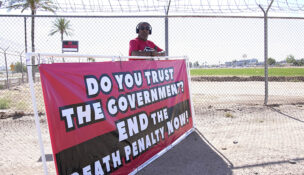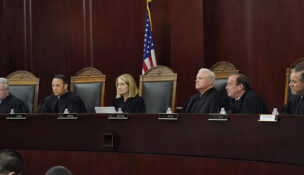Douglas accuses education board of playing games, seeks lawsuit dismissal
Howard Fischer, Capitol Media Services//November 24, 2015//[read_meter]
Douglas accuses education board of playing games, seeks lawsuit dismissal
Howard Fischer, Capitol Media Services//November 24, 2015//[read_meter]

A lawsuit by the state Board of Education against state schools chief Diane Douglas should be thrown out because of legal “gamesmanship,” her lawyer is arguing to a judge.
Steve Tully said the board wants a court to rule that its investigators should be allowed remote access to teacher files. Douglas has said they can have it — but only if they come to her office.
But Tully pointed out to Maricopa County Superior Court Judge Arthur Anderson that when Douglas sued the board over similar issues, the panel took the position that these are political questions beyond the reach of a court. And the board even got a different judge to agree.
So now he wants Anderson to rule that the board, in essence, cannot have its legal cake and eat it, too: He is asking the judge to throw out the board’s lawsuit.
The legal fight follows the decision earlier this year by the board to move its employees out of the Department of Education building controlled by Douglas. She sued, asking for a ruling that she controls board employees and the move was illegal.
Maricopa County Superior Court Judge Patricia Starr sidestepped the question, ruling in essence that these were political issues not appropriate for a court to intercede. But Starr said that, given the information she had, she believed the board had done nothing wrong.
That case is on appeal.
Meanwhile, Douglas has told the board’s investigators, who review teacher files while looking at allegations of wrongdoing, that they cannot have remote access.
Douglas said it’s an issue of security. But she also has claimed state law requires them to serve under her direction, including where they work.
Board members responded in September by filing their own lawsuit, demanding not only remote access but also that Douglas surrender control of a web site the board had used.
But Tully said they can’t legally do that because it’s 180 degrees counter to what their lawyers had claimed before.
“The board argued in the first lawsuit that the superintendent’s claims were non-justicable political questions,” Tully wrote in his pleadings, a contention Starr accepted.
“Here is the problem: Either all of the votes taken by the board creating ‘policy’ represent justicable questions, or none of them represent justicable questions,” he continued. “Such gamesmanship should not be permitted by this court.”
If Anderson does not buy that legal argument, Tully has a backup in his bid to have the lawsuit tossed.
He said courts are allowed to order officials to do something only when these are considered “ministerial” duties, where there is no discretion.
For example, he said, the judge would have to find that the state treasurer has a specific duty to make out checks to meet payroll.
“Even if it’s more than he thinks the state should spend, he doesn’t have any right to not cut the checks,” Tully explained.
The squabble over access by the board’s investigators has resulted in Republican legislative leaders seeking to intervene.
In a letter earlier this month to both Douglas and Greg Miller, president of the board, Senate President Andy Biggs and others said they don’t necessarily know — or care — who is legally right. But they want the problem resolved.
“Without a robust assurance that those accused of immoral or unprofessional conduct are being investigated and held accountable for their actions in a timely manner, we are concerned that student safety may be in jeopardy while the legal disputes run their course,” they wrote.
Douglas responded that she agrees the issue should be resolved — but on her terms.
















